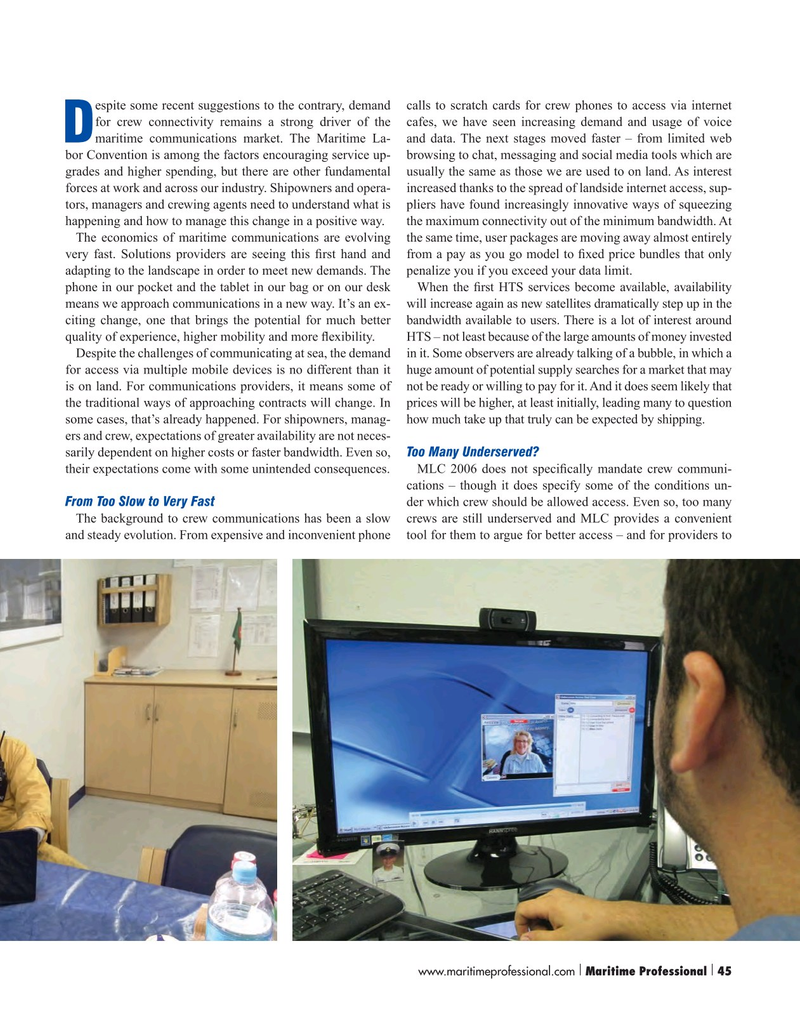
Page 45: of Maritime Logistics Professional Magazine (Q1 2016)
Maritime Training and Education
Read this page in Pdf, Flash or Html5 edition of Q1 2016 Maritime Logistics Professional Magazine
espite some recent suggestions to the contrary, demand calls to scratch cards for crew phones to access via internet for crew connectivity remains a strong driver of the cafes, we have seen increasing demand and usage of voice
Dmaritime communications market. The Maritime La- and data. The next stages moved faster – from limited web bor Convention is among the factors encouraging service up- browsing to chat, messaging and social media tools which are grades and higher spending, but there are other fundamental usually the same as those we are used to on land. As interest forces at work and across our industry. Shipowners and opera- increased thanks to the spread of landside internet access, sup- tors, managers and crewing agents need to understand what is pliers have found increasingly innovative ways of squeezing happening and how to manage this change in a positive way. the maximum connectivity out of the minimum bandwidth. At
The economics of maritime communications are evolving the same time, user packages are moving away almost entirely very fast. Solutions providers are seeing this ? rst hand and from a pay as you go model to ? xed price bundles that only adapting to the landscape in order to meet new demands. The penalize you if you exceed your data limit. phone in our pocket and the tablet in our bag or on our desk When the ? rst HTS services become available, availability means we approach communications in a new way. It’s an ex- will increase again as new satellites dramatically step up in the citing change, one that brings the potential for much better bandwidth available to users. There is a lot of interest around quality of experience, higher mobility and more ? exibility. HTS – not least because of the large amounts of money invested
Despite the challenges of communicating at sea, the demand in it. Some observers are already talking of a bubble, in which a for access via multiple mobile devices is no different than it huge amount of potential supply searches for a market that may is on land. For communications providers, it means some of not be ready or willing to pay for it. And it does seem likely that the traditional ways of approaching contracts will change. In prices will be higher, at least initially, leading many to question some cases, that’s already happened. For shipowners, manag- how much take up that truly can be expected by shipping.
ers and crew, expectations of greater availability are not neces- sarily dependent on higher costs or faster bandwidth. Even so, Too Many Underserved?
their expectations come with some unintended consequences. MLC 2006 does not speci? cally mandate crew communi- cations – though it does specify some of the conditions un-
From Too Slow to Very Fast der which crew should be allowed access. Even so, too many
The background to crew communications has been a slow crews are still underserved and MLC provides a convenient and steady evolution. From expensive and inconvenient phone tool for them to argue for better access – and for providers to www.maritimeprofessional.com Maritime Professional 45| | 34-49 Q1 MP2016.indd 45 2/29/2016 11:14:32 AM

 44
44

 46
46
